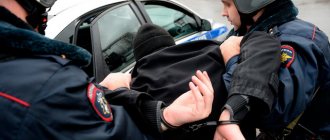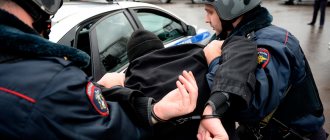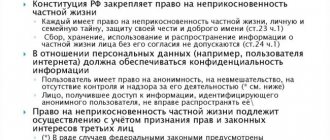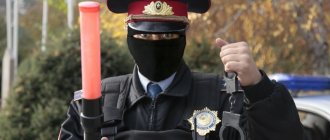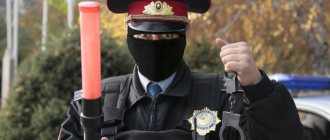illegal demand of a police officer
When meeting with law enforcement officers, many citizens find themselves at a loss and do not know how to behave.
But there is a category of citizens who, when asked by a police officer to present documents, do not obey the police, try to run away or insult the police officer during arrest. Often citizens directly resist the police (break out, do not allow them to handcuff, etc.). This act will be qualified by the court as resistance to law enforcement officials or a police officer .
Knowing your basic rights and responsibilities will help you avoid becoming a victim of arbitrariness and breaking the law yourself.
Even if you believe that you were detained illegally , it is important not to resist, remain calm and not insult the law enforcement officer.
Do not threaten police officers or attempt physical violence.
What powers does the police have?
First of all, the police can:
- check citizens' identity documents, as well as;
- inspect and detain citizens suspected of committing an offense;
- enter (penetrate) residential and other premises, land plots and territories.
The order of these procedures is prescribed in Art. 13-15 of the Police Law.
If the detainee shows resistance or disobedience, the police have the right to use physical force.
Resisting police officers during arrest
Detention is a short-term restriction of freedom, the right to which police officers have. According to paragraph 1 of Art. 14 of Federal Law No. 3 “On the Police”, the maximum period for detaining a person by police officers is 48 hours.
Employees may detain a citizen in the following cases:
- his suspicions of committing a crime;
- choosing a preventive measure in the form of detention;
- his evasion from execution of punishment;
- he is wanted;
- in some cases when administrative proceedings are being conducted against a person;
- violation by a citizen of the curfew rule;
- illegal entry or attempt to enter protected facilities;
- suicide attempts;
- presence of signs of severe mental disorder;
- receiving a request to extradite its citizen to a foreign state;
- when a person’s actions create a danger to him and others.
Detention for a period not exceeding three hours is provided for in Art. 27.3-27.5 of the Code of Administrative Offenses of the Russian Federation. The measure is applied when a citizen commits an administrative offense when it is necessary for the timely and correct consideration of the case or the execution of a judicial act in the case: suppression of illegal actions, identification of the offender, drawing up a protocol on the administrative offense, if it cannot be drawn up at the place where the administrative offense was detected. Grounds for detention by the police can be within the framework of administrative and criminal procedural legislation.
Detention to determine the identity of the offender is carried out if he, at the request of a police officer, has not provided one of the following documents:
- passport of a citizen of the Russian Federation;
- temporary identity card issued during the passport replacement procedure;
- birth certificate for citizens who do not have a passport due to age;
- passport of a foreign citizen;
- a stateless person's document on the right to stay in the Russian Federation;
- military ID of a serviceman.
To find out the identity, you need to go to the police station, where officers will do this based on the information provided about themselves by the detainee using an electronic information database.
Detention for two days is provided for by the provisions of Article 91 of the Criminal Procedure Code, as well as paragraphs 2 and 3 of Art. 27.5 Code of Administrative Offenses of the Russian Federation. In the event of detention for such a long period, the detainee has the right to ask employees to notify his relatives, management at the place of work or study, as well as his defense attorney about the measure taken against him. The officer must do this as soon as possible, but no later than three hours from the moment of detention. If a minor is detained, his parents are notified immediately.
Administrative grounds for detention for up to 48 hours include, firstly, the need to establish identity or clarify circumstances related to:
- consideration of cases of encroachment on the state border regime of the Russian Federation and violation of the procedure for staying on the territory of the Russian Federation;
- consideration of cases of violation of customs rules or commission of an offense in territorial waters, continental shelf, exclusive economic zone of the Russian Federation.
Secondly, the basis for detention for two days is the prospect of administrative arrest or deportation from the country.
A person suspected of committing a crime may be detained for 48 hours and brought to the body of inquiry or to an investigator if one of the following circumstances exists:
- the person is caught in the process of committing a crime or immediately afterwards;
- evidence of the victim or eyewitnesses about the fact of the commission of a crime by this particular person;
- when obvious traces of a crime are found on the suspect, his clothes, on him or in his home.
Police officers cannot detain a citizen for more than two days. This is done only at the discretion of the court hearing the criminal case against the person.
What is the penalty for failure to comply with the demands of a police officer, the penalties applied for resistance?
Administrative responsibility
Failure to comply with lawful demands of police officers or obstruction of law enforcement officers usually refers to administrative violations.
Art. 19.03 of the Code of Administrative Offenses of the Russian Federation provides for a fine of 500 to 1000 thousand rubles for these actions, or arrest for up to 15 days (if such an act is committed for the first time). Repeated offenses entail a fine of 5,000 rubles or arrest for up to 30 days.
A citizen can also be charged with petty hooliganism under Art. 20.01 Code of Administrative Offenses of the Russian Federation.
Petty hooliganism is a violation of public order, expressing clear disrespect for society, accompanied by obscene language in public places, offensive harassment of citizens, as well as destruction or damage to other people's property.
Punishment for petty hooliganism is a fine of 500 to 2,500 rubles, or arrest for up to 15 days.
Criminal liability
Criminal liability arises for publicly insulting a government official in the performance of his official duties, for the use of violence or the threat of violence against a government official or his close persons in the performance of his official duties.
Thus, if a citizen resists the police, he may be prosecuted under Article 213 of the Criminal Code of the Russian Federation for Hooliganism.
Punishment for hooliganism includes a fine of 500 thousand rubles. up to 1 million rubles or imprisonment for up to 7 years.
Read how to distinguish petty hooliganism from hooliganism here>>> .
For non-dangerous violent actions (or the threat of violence), a citizen can be fined up to 200 thousand rubles or imprisoned for up to 5 years.
If the violence caused harm to health or threatened the life of a police officer, then the punishment will be severe - up to 10 years in prison.
Punishment for the use of violence is regulated by Art. 317-319 of the Criminal Code of the Russian Federation.
The punishment is established by the court taking into account aggravating or mitigating circumstances. It depends, first of all, on the degree of damage caused to the police officer. Insults towards a law enforcement officer or damage to his uniform aggravate the crime. Therefore, you can be charged under several articles at once for resisting a police officer.
If you decide to defend yourself, you should remember that:
- All cases are unique and individual;
- Understanding the basics of the law is useful, but does not guarantee results;
- The possibility of a positive outcome depends on many factors.
Fine for disobedience
For disobedience, criminal but also administrative liability is provided. For failure to comply with the requirements of a person on duty, or for obstructing him in fulfilling his duties to protect law and order, he may be held accountable under Art. 19.3 Code of Administrative Offenses of the Russian Federation.
To prove illegal actions, it is enough for police to draw up a report on an administrative offense. As a result, the citizen will have to pay a fine to the state in the amount of 500 to 1,500 rubles.
Disobedience and resistance, what's the difference?
Disobedience is defined in the Code of Administrative Offenses of the Russian Federation as a clear unwillingness to comply with legal requirements or ignoring them.
Characteristic signs of disobedience
- failure of a citizen who has committed an offense or is suspected of it to comply with the lawful request of the police;
- ignoring comments;
- refusal to comply with police demands;
- obstructing the performance of official duties by a police officer.
Resistance to police officers is intentional active actions that impede their work.
Criminal liability
Disobedience to a lawful order of a police officer may result in criminal liability in accordance with a number of articles of the Criminal Code of the Russian Federation. It occurs when law enforcement officers are publicly insulted during their work. Violence or the threat of violence will result in more severe punishment.
Criminal liability also arises for resisting law enforcement officers during an arrest. And also for hooliganism against police officers.
Armed resistance to police
The use of weapons as such does not serve as an aggravating circumstance in court proceedings. In such cases, the decisive factor is the degree of harm caused to the police officer and the presence of a threat to life.
However, if a citizen who resisted arrest by police officers is found to have a weapon, additional liability arises, determined by the Criminal Code.
For example, if there is no official permit for a weapon, this will aggravate the guilt of the detained citizen.
You cannot carry a weapon while intoxicated or draw it unless there is a direct threat to life.
In addition, it is prohibited to bring weapons to public events (rallies, concerts, religious meetings).
So a citizen who is detained with a weapon and resists can be prosecuted on at least two counts - illegal possession and carrying of weapons and hooliganism.
Illegal demands
For disobedience to a police officer (Administrative Code Article 19.3, part 1) punishment is due. But law enforcement officials do not always act in accordance with their powers. And that is why Article 19.3, Part 1 causes the most controversy. Police sometimes demand documents for verification without any reason.
And if a citizen begins to ask why a passport is required, then the police, instead of answering, take him to the department. And there a protocol of disobedience is already drawn up.
For disobedience to a law enforcement officer, a citizen may be fined or subject to other administrative penalties. And the situation here is twofold. A citizen will not be able to prove that he spoke politely with government officials. And the police can always claim that they acted legally. For example, that a citizen refused to go to the department or looks like a wanted criminal. And when it comes to court, he mostly sides with the police.
Difference between legal and illegal and illegal demands of a police officer
It is not always possible to understand whether the demands of law enforcement officers are legal or illegal.
The policeman’s demands to present documents and stop illegal actions or actions that pose a threat to someone’s life are clearly legal. Police may also require you to leave the scene of a crime or search operation.
The requirement to proceed to the police station in connection with the arrest is also legal, as well as to show things: the contents of a bag, pockets or clothing. But in these cases, the police are required to follow a formal procedure - draw up a protocol (see sample below). Neglect of the rules of procedure creates great opportunities for arbitrariness.
The most controversial requirement is to leave a public street event. The police have no right to disperse or detain public rallies unless they are spontaneous and have been agreed upon with the city administration.
You need to be sure that the event you are attending is organized in accordance with the law. Then the arrest will be considered illegal.
Recently, a person's life can be tracked by his phone.
If the police demand that you show the contents of your phone, such a demand is unlawful.
The law guarantees the protection of personal data and the right to privacy of correspondence. Access to them can only be obtained by court order. Even if arrested, the police do not have the right to demand this.
This also includes the demand for a bribe. There is serious responsibility for this. Therefore, most often the police speak about a bribe in hints. This makes it more difficult to prove the fact of extortion.
Responsibilities of police officers and citizens' rights
Legislation limits the powers of the police, gives them responsibilities, and gives citizens rights when interacting with representatives of the law.
Before checking documents, searching or arresting a police officer is obliged to:
- introduce yourself;
- state your official title and position;
- present a valid ID.
During detention:
- explain the reason for the detention;
- read out to the citizen his rights and obligations;
- draw up a protocol, providing the detainee with a copy.
Until the policeman does this, all his demands are considered illegal.
It is especially important to request a copy of the arrest and personal search protocol. If you want to prove the illegality of police actions in court, the protocol will be one of the main pieces of evidence. If you have a copy of this document, then it can no longer be rewritten in the way the police need.
Typically, the protocol for personal inspection of items looks like this:
You have the right to demand compliance with these conditions, and in the event of detention:
- receive a copy of the protocol;
- make one phone call (you must be given this opportunity no later than three hours from the moment of arrest);
- use the services of a lawyer and translator.
Detention cannot last more than 48 hours. Before the end of this period, the detainee must be released or provided with a court decision on his arrest.
During the inspection, require the presence of witnesses and the drawing up of a protocol. Only a person of the same sex as you can inspect you. There is a high probability that the police will simply not search you, not wanting extra paperwork.
How should documents be verified?
Disobedience to a police officer is punishable by law. But police officers must act strictly according to the Charter. Citizens of the Russian Federation are not required to carry an identity card with them at all times. Therefore, such a demand from a police officer would be illegal. This means that the citizen does not bear any responsibility.
The most common case of detention is a document check. In this case, the police officer must be in uniform. Have a service ID and a route or post card, which indicates the patrol location and the exact time of duty. When stopping a citizen, the policeman must introduce himself, say hello, state his position, full name and reason for checking documents. And at the request of the citizen, present him with his official ID, explain the reasons for checking the documents:
- the citizen looks like an identikit of a wanted offender;
- the person has escaped or is hiding from punishment;
- the citizen evades compulsory medical measures or visiting a specialized medical institution;
- a person tries to enter a protected area;
- when a citizen attempts suicide or has a pronounced mental disorder;
- search for persons who escaped from a psychiatric hospital;
- there is a requirement to extradite a foreign citizen in the manner prescribed by the current legislation of the Russian Federation.
Rights of traffic police officers
In many ways, the rights and responsibilities of traffic police officers and ordinary police officers overlap. They are also required to introduce themselves, present identification, draw up reports of offenses, and provide copies of them to drivers.
In addition, traffic police officers have the right to:
- demand to stop the vehicle;
- check identification documents confirming the right to own and drive a vehicle;
- refer the driver for a medical examination for alcohol or drug intoxication;
- accompany citizens to the hospital in case of a real threat to their life and health.
Unlawful assault by a police officer
Unlawful assault by a police officer is very rare. In such cases, police officers face more severe punishment than ordinary citizens - the use of official position is an aggravating circumstance.
An assault is considered unlawful if there are no clear signs of an offense or if the police officer failed to fulfill his duties. In addition, the police do not have the right to use weapons unless there is a threat to someone’s life or health.
In such cases, there is no question of resisting a police officer during arrest. A citizen who has been unlawfully attacked has the right to defend himself. Including the use of weapons for which he has permission or does not require special permission. The main thing is not to exceed the limits of permissible self-defense.
In practice, if you are attacked by a police officer, it will be very difficult to prove it in court!
The performance of police duties is often associated with various risks. The use of physical force or even weapons may be required in a variety of situations - both to protect life or health, and, for example, to detain criminals, and therefore is the right of the police.
The list of cases when law enforcement officers have the right to use physical force, special means and firearms, as well as the procedure for their use, are clearly regulated by law.
A police officer has the right to use physical force only when non-forceful methods do not ensure the fulfillment of official duties, namely, if it is necessary to overcome opposition to the legal demands of a police officer (for example, when a police officer asks to clear part of the sidewalk for the passage of special vehicles), to stop an offense or crime, or to deliver offender to the office premises.
In addition, the employee has the right to use physical force in cases where the use of special means or firearms is permitted.
The police are armed with a large number of special equipment - from rubber sticks and gas canisters to water cannons and armored vehicles.
The list of situations in which a police officer can use special means:
- to repel an attack on a citizen or police officer;
- to suppress a crime or administrative offense;
- to suppress resistance to a police officer;
- to detain a person caught committing a crime and trying to escape;
- to detain a person if this person can offer armed resistance;
- for delivery to the police, escort and protection of detained persons, persons taken into custody, persons sentenced to imprisonment, persons subjected to administrative punishment in the form of administrative arrest, as well as for the purpose of stopping an escape attempt, if a person resists a police officer, causing harm to others or yourself;
- to release forcibly detained persons, seized buildings, premises, structures, vehicles and land plots;
- to suppress riots and other illegal actions that disrupt traffic, the operation of communications and organizations;
- to stop a vehicle whose driver has not complied with the police officer’s request to stop;
- to identify persons who commit or have committed crimes or administrative offenses;
- to protect protected objects, block the movement of groups of citizens committing illegal actions;
- in cases where a police officer is allowed to use firearms;
At the same time, a police officer is prohibited from using special means against women with visible signs of pregnancy, as well as persons with obvious signs of disability and minors, if they do not offer armed resistance and do not try to attack strangers or police in a group, or if such the attack threatens anyone's life or health. In some cases, the law provides for derogations from these restrictions.
Finally, the police also have the right to use firearms:
- to protect another person or oneself from an attack, if this attack involves violence dangerous to life or health;
- to suppress attempts to seize firearms, police vehicles, special and military equipment in service (support) of the police;
- to free hostages;
- to detain a person caught committing an act containing signs of a grave or especially grave crime against life, health or property, and trying to escape, if it is not possible to detain this person by other means;
- to detain a person offering armed resistance, as well as a person refusing to comply with a legal requirement to surrender weapons, ammunition, explosives, explosive devices, toxic or radioactive substances in his possession;
- to repel a group or armed attack on buildings, premises, structures and other objects of state and municipal bodies, public associations, organizations and citizens;
- to prevent the escape from places of detention of suspects and accused of committing crimes or the escape from convoy of persons detained on suspicion of committing a crime, persons against whom a preventive measure in the form of detention has been applied, persons sentenced to imprisonment, as well as to suppress attempts to forcefully release these persons.
- to stop a vehicle by damaging it, if the person driving it refuses to comply with the repeated demands of a police officer to stop and tries to escape, creating a threat to the life and health of citizens;
- to neutralize an animal that threatens the life and health of citizens and (or) a police officer;
- to destroy locking devices, elements and structures that prevent entry into residential and other premises;
- to fire a warning shot, sound an alarm, or call for help by firing a shot upward or in another safe direction.
The law prohibits the use of lethal weapons against women, persons with obvious signs of disability, and minors when their age is obvious or known to the police officer, except in cases where these persons offer armed resistance, commit an armed or group attack, which is threatened by someone else. either life or health.
It is also prohibited to use firearms in large crowds of citizens if this could result in injury to bystanders.
The law assumes that if a police officer does not have special equipment or weapons, then in a state of necessary defense, in case of emergency or when detaining a criminal, he has the right to use any improvised means or other weapons that are not in service with the Ministry of Internal Affairs.
Exceeding authority by a police officer when using physical force, special means or firearms entails liability established by law.
The procedure for using physical force, special means and firearms
What to do if a police officer acts illegally
In the event of unlawful demands from the police, you may refuse to comply with them if such actions are clearly violent.
Be sure to tell the police that you believe their actions were unlawful. Require formalities.
But when it is difficult to distinguish a legal requirement from an illegal one, it is better to obey the police.
You will still have to prove your position in court that the police acted unlawfully. And our courts are usually on the side of the police.
But if they are trying to illegally arrest you, it is better not to offer physical resistance. Even if you manage to prove that the arrest was illegal, you may still be prosecuted.
What influences the court's decision in a case of assault on a police officer?
Assaulting a police officer is a more serious offense than disobeying or resisting. It is punishable under Articles 317 and 318 of the Criminal Code. In especially serious cases, the offender may be sentenced to life imprisonment.
The presence or absence of a direct threat to the life of the policeman, the degree of harm caused, and the physical and mental state of the attacker play a role here.
Ideally, when considering such cases, the court is obliged to take into account all the circumstances, but in practice, prepare for the fact that the court will be biased against you.
